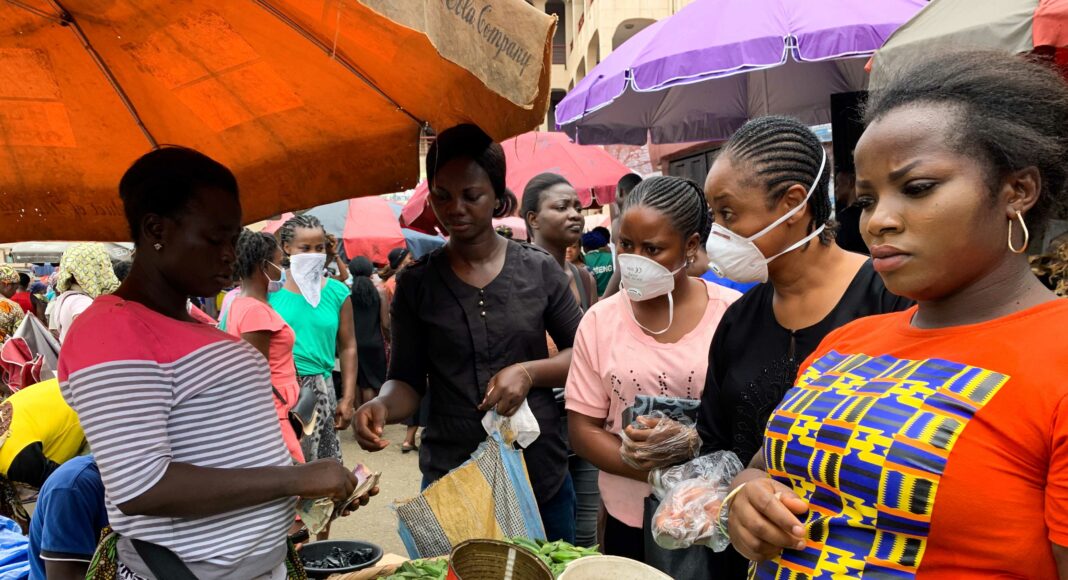By Olakunle Ologunro
Two years ago, Foluke Akinosho*, a 63-year-old petty trader who sells food provisions in the Mushin area of Lagos, Nigeria, received a TraderMoni loan of N20,000 to help her business. The process was simple: she put down her name and phone number, and after these details were confirmed, the money was transferred to her bank account. There was only one catch: the loan was too small to purchase anything of real value, and had no impact on her business.
When Nigerian Vice President Yemi Osinbajo launched the Trader Moni scheme in 2018 among fanfare and photo-ops, he hailed the project as a financial lifesaver that would bring petty traders and artisans out of poverty. “[TraderMoni] is a practical way of assisting hardworking Nigerian traders who are at the bottom of the ladder but who have aspirations to do bigger and better business,” he said. And for a country like Nigeria with over 40 percent of the total population living below the poverty line, TraderMoni seemed like a much-needed income boost.
TraderMoni is managed by the office of the vice president and is administered by the Bank Of Industry as a part of the Government Enterprise and Empowerment Programme (GEEP) scheme of the Federal Government. The loan is designed like a pyramid scheme in that traders start from N10,000 and can get up to N100,000 as they pay back each loan. N10,000 is the first loan. When this has been paid back, the trader qualifies for a second loan of N15,000. After that has also been paid back, the traders qualify for a N20,000 loan, then N50,000, and then N100,000. These loans are interest-free.
On the surface, TraderMoni seems like a good micro-economic initiative, which is why artisans and petty traders like Akinosho applied to become beneficiaries. But the loans have had little to no impact on borrowers’ businesses or income levels, revealing the initiative’s shallow impact. “It was too small to be impactful for the business. It couldn’t even purchase a carton of goods. A good part of the loan was spent on food,” Akinosho explained.
This failure can be attributed to a number of factors. First, the timing of the scheme’s launch coincided with the presidential election campaign period in 2018, leading people to believe it was a ploy to secure the votes of the people belonging to the market demographic. Rather than fulfilling a genuine need, some think TraderMoni’s real purpose was to create a narrative of the Buhari-Osinbajo administration as active and attuned to the needs of the public.
“They came during the campaign period,” Kafayat Ileseanmi*, a trader at Bodija market, Ibadan, told Sahelien.com. “The Vice President, and the then governor of Oyo state, Abiola Ajimobi. They even came with some movie stars and convinced us about the loan. There was a very large crowd, but even then, only a few of us got the loan,” she said.
Some traders have criticized the way TraderMoni loans have been disbursed. After Osinbajo’s appearance and photo-ops, in most of the states, the disbursement was not completely supervised, which opened up a space for TraderMoni agents to charge the loan beneficiaries a percentage of the loans before disbursement. In some cases, traders are charged as low as N200 or as high as N1,000. Beyond this, partiality and connections also factor into who got the loan and who didn’t. Knowing someone who is in charge of the disbursement puts you at a higher chance of getting the loan, compared to another trader who knows no agent or has no connection.
These reasons are part of why a large number of the traders have said they are not interested in returning the loans. In the face of the Naira’s constant devaluation and inflation, the prices of goods keep rising and there is only little that N10,000 can purchase for the business. There is also no structure in place to facilitate loan refunds and recollection. The scheme is seen by many traders as a one-time, cash-out scheme.
The Government Enterprise and Empowerment Programme (GEEP) has provided loans between N10,000 and N300,000 to traders, according to Sadiya Umar-Farouq, the Minister of Humanitarian Affairs, Disaster Management and Social Development. Although this sounds impressive, the traders’ stories prove otherwise.
“The whole idea [of TraderMoni] is that we want to ensure that we give whatever support to people to alleviate their businesses,” Osinbajo stated. But with the way it is currently run, TraderMoni is far from achieving its main goal of alleviating poverty and boosting income. The program lacks sustainability, and in the long-run, will fade away with no record of real impact.
“Soft loans are important in providing economic relief to market traders,” Macdonald Ukah, an economist at Kainos Edge Consulting Limited, told Sahelien.com. “But with TraderMoni, what the government should have done first is identify and solve some of the structural challenges faced by the market traders,” he said.
*Names with asterisks have been changed to protect the identities of those quoted.

